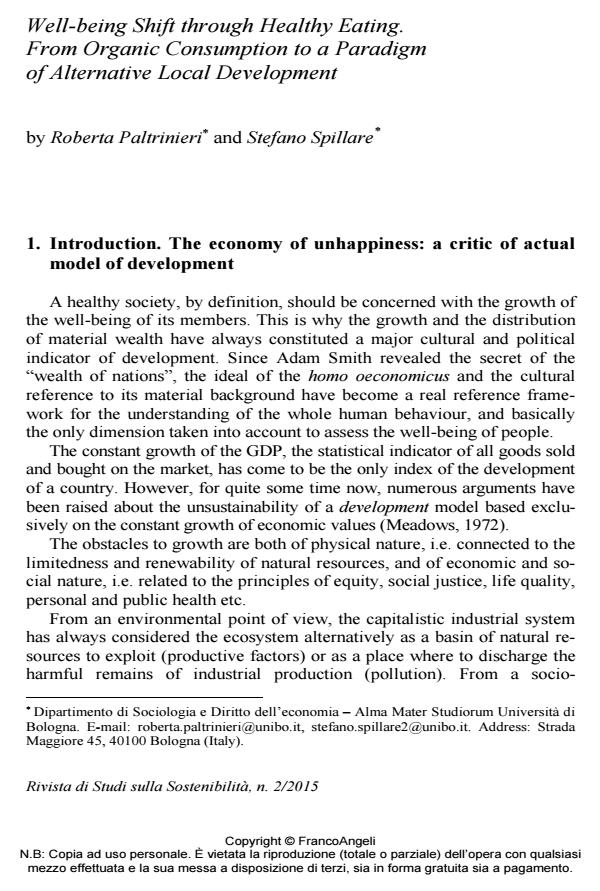Well-being Shift through Healthy Eating. From Organic Consumption to a Paradigm of Alternative Local Development
Titolo Rivista RIVISTA DI STUDI SULLA SOSTENIBILITA'
Autori/Curatori Roberta Paltrinieri, Stefano Spillare
Anno di pubblicazione 2015 Fascicolo 2015/2
Lingua Inglese Numero pagine 12 P. 83-94 Dimensione file 153 KB
DOI 10.3280/RISS2015-002008
Il DOI è il codice a barre della proprietà intellettuale: per saperne di più
clicca qui
Qui sotto puoi vedere in anteprima la prima pagina di questo articolo.
Se questo articolo ti interessa, lo puoi acquistare (e scaricare in formato pdf) seguendo le facili indicazioni per acquistare il download credit. Acquista Download Credits per scaricare questo Articolo in formato PDF

FrancoAngeli è membro della Publishers International Linking Association, Inc (PILA), associazione indipendente e non profit per facilitare (attraverso i servizi tecnologici implementati da CrossRef.org) l’accesso degli studiosi ai contenuti digitali nelle pubblicazioni professionali e scientifiche.
Starting from the fact of the crisis of the current model of development, this work aims to propose an interpretive framework to the possibilities of alternative social development based on "critical consumption" and its ability to stimulate social capital, civic engagement and the shared responsibility. The assumption is the relationship and collaboration between consumers, between consumers and producers, as well as among all the other social stakeholders of the local context (businesses, government and associations). Thanks to the example of the alternative organic food supply chain (the socalled Alternative Food Networks), the authors examine the way in which consumers, farmers and civil society could be involved in the creation of alternative models of understanding economic relations, now more focused on the concept of common good than based on the mere economic interest.
A partire dalle evidenze relative alla crisi dell’attuale modello di sviluppo, il presente lavoro intende proporre un possibile framework interpretativo legato alle possibilità di sviluppo economico e sociale basata sul "consumo critico" e sulla sua capacità di incentivare il capitale sociale, l’impegno civico e la responsabilità condivisa grazie alle reti di relazione tra consumatori, tra consumatori e produttori, nonché tra questi e gli altri stakeholders locali (imprese, Amministrazioni pubbliche e associazionismo). Grazie all’esempio offerto dalle forme alternative di approvvigionamento legate al cibo biologico (i cosiddetti Alternative Food Networks) gli autori esaminano in che modo consumatori, produttori e società civile possono essere coinvolti nello sviluppo di modelli alternativi di intendere le relazioni economiche, ora incentrate più sul concetto di bene comune che sul mero interesse economico.
Parole chiave:Benessere, sostenibilità, agricoltura biologica, agricoltura civica, alternative food networks
- Networks, Markets & People Stefano Spillare, pp.176 (ISBN:978-3-031-74671-0)
- Engagement and subjective well‐being in alternative food networks: The case of Hungary Agnes Neulinger, Fanni Bársony, Natasha Gjorevska, Orsolya Lazányi, György Pataki, Sándor Takács, Anna Török, in International Journal of Consumer Studies /2020 pp.306
DOI: 10.1111/ijcs.12566
Roberta Paltrinieri, Stefano Spillare, Well-being Shift through Healthy Eating. From Organic Consumption to a Paradigm of Alternative Local Development in "RIVISTA DI STUDI SULLA SOSTENIBILITA'" 2/2015, pp 83-94, DOI: 10.3280/RISS2015-002008